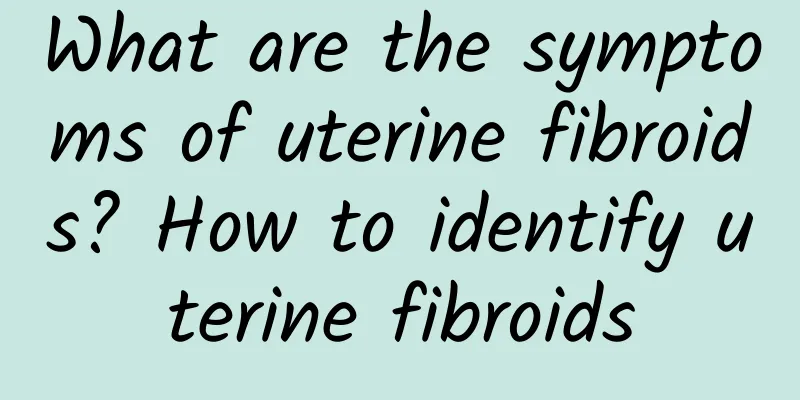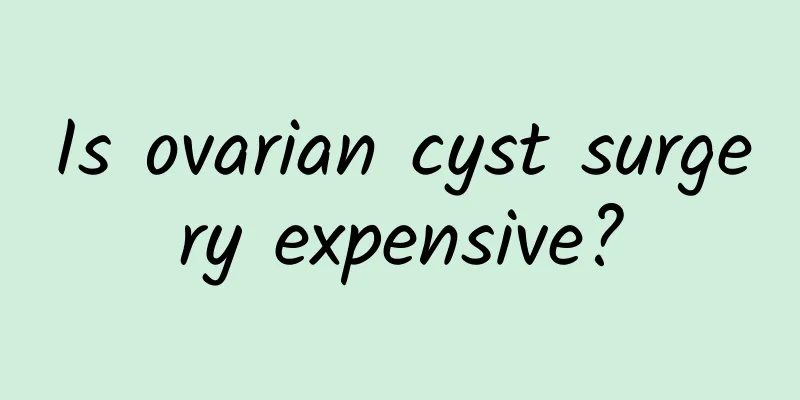What are the symptoms of uterine fibroids? How to identify uterine fibroids

|
The symptoms of uterine fibroids are not obvious in the early stage. Only when the uterine fibroids are large in size or grow in a special location will obvious symptoms appear, mainly including the following aspects: Pain: Generally there is no pain. However, when the fibroids undergo red degeneration or the pedunculated fibroids are twisted or the submucosal fibroids stimulate the uterus to have spasmodic contractions, it can cause acute abdominal pain. Uterine fibroids can affect women's menstruation, leading to abnormal menstruation and increased bleeding. For example, long-term heavy menstruation caused by uterine fibroids can lead to secondary anemia. In severe cases, it manifests as general fatigue, pale face, shortness of breath and palpitations. Menstrual changes: Menstrual changes are the most common symptoms of uterine fibroids, which are manifested as increased menstrual volume, shortened cycle or prolonged menstrual period, and irregular bleeding. Submucosal fibroids can cause bleeding due to increased mucosal area and necrosis and infection on the surface. When intramural fibroids are larger, the uterine cavity becomes larger, the endometrial area increases, the uterus contracts poorly, or when combined with excessive endometrial hyperplasia, it manifests as shortened menstrual cycle, increased menstrual volume, prolonged menstrual period, etc. Increased vaginal discharge is common in larger intramural fibroids. Due to the enlargement of the uterine cavity, the glandular secretion increases, resulting in increased leucorrhea. When submucosal fibroids are accompanied by infection, the amount of leucorrhea is also large, and sometimes it may be bloody. Compression symptoms: The enlargement of fibroids can compress nearby organs and produce various symptoms. For example, uterine wall fibroids or cervical fibroids can compress the bladder, causing frequent urination, urination disorders, and urine retention. Compression of the ureter can cause hydronephrosis. Myomas on the posterior wall of the uterus can squeeze the rectum and cause difficulty in defecation. Infertility: 25-35% of patients with uterine fibroids may suffer from infertility because the fibroids hinder the implantation of the fertilized egg or the fibroids prevent the sperm from entering the fallopian tube. |
<<: What should I do if I suffer from uterine fibroids? What are the symptoms of uterine fibroids?
>>: Symptoms of uterine fibroids Can uterine fibroids cause uterine bleeding
Recommend
Oral Chinese medicine combined with fumigation and washing for the treatment of vulvar leukoplakia
At present, the cause of vulvar leukoplakia has n...
How to maintain after minimally invasive abortion? 7 quick tips to help you recover quickly
Although minimally invasive abortion is not a maj...
What are some good ways to solve irregular menstruation?
What are the treatments for irregular menstruatio...
Precautions and treatment after artificial abortion
After an abortion, you need to pay special attent...
Don’t just focus on the front when training your core! 360-degree training for your core muscles
As a woman, even though we live in an increasingl...
Women aged 20 to 50 should read this! Eat like this to stay healthy
Everyone hopes that they can live to old age in g...
What should patients with dysmenorrhea pay attention to?
What are the precautions for dysmenorrhea? During...
What are the causes of gynecological uterine fibroids and how to prevent them?
With the development of modern fast-paced life, m...
What causes dysmenorrhea?
Dysmenorrhea is common in adolescent girls, unmar...
Under what circumstances will cervical warts recur?
As we all know, in order to cure the disease, it ...
Does cervical hypertrophy affect life expectancy?
Whether cervical hypertrophy will directly affect...
What exactly is cervical erosion?
Generally speaking, women are most afraid of gyne...
Get rid of the title of elephant leg! Try 3 Lower Body Sculpting Exercises
【Sports Guide】 It is suitable for apple-shaped, b...
Knowing the symptoms of vulvar leukoplakia can help detect the patient's condition as early as possible
With the continuous changes in living environment...
Expert advice: Several effective nursing methods for dysmenorrhea
Women often feel uncomfortable before and after m...









